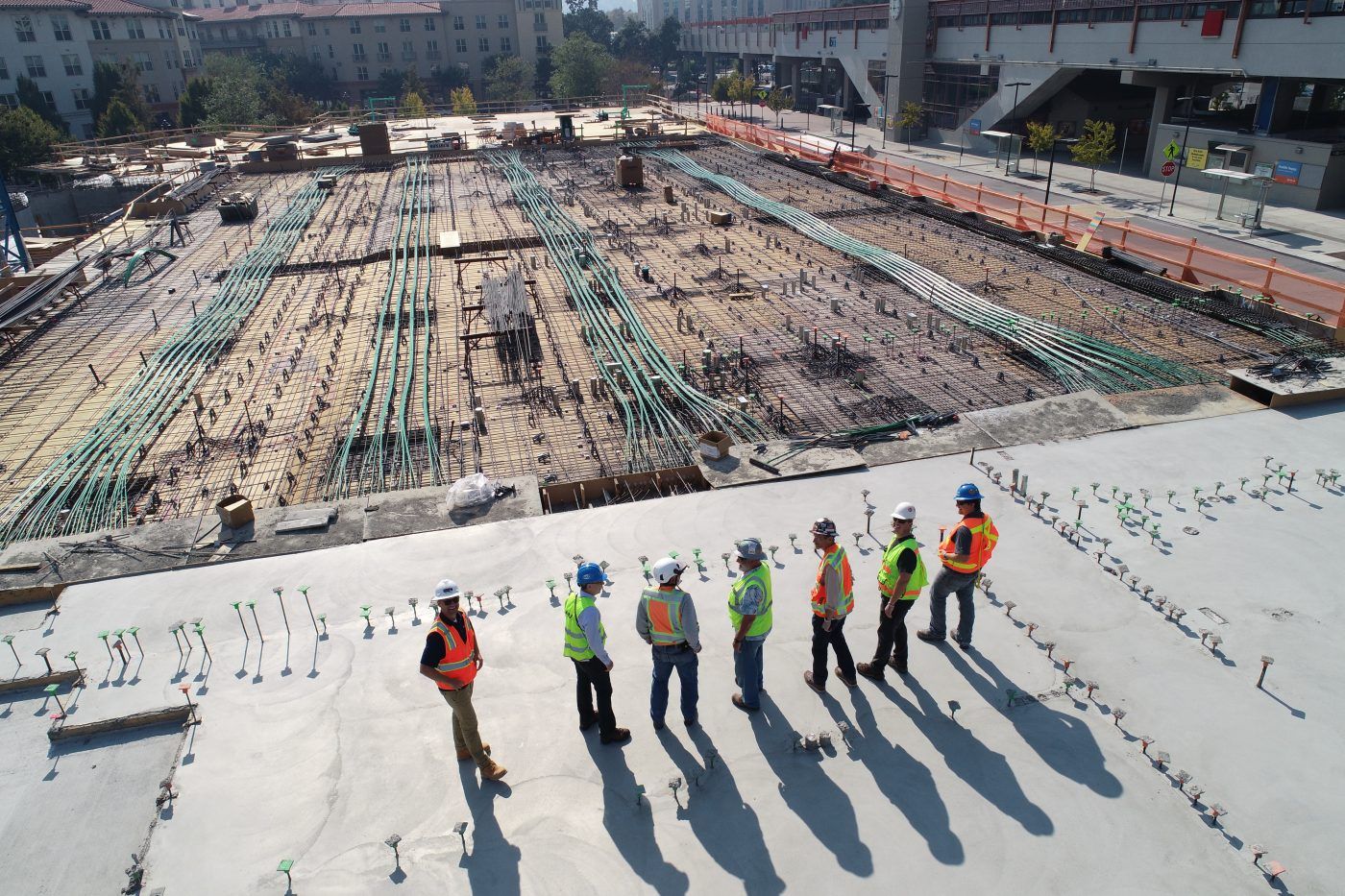Construction has historically been slower than other industries to adopt new digital marketing strategies, with many contractors and businesses having relied heavily on traditional relationships and networking to win new business in the past.
However, this is starting to change. An increasing number of construction marketing professionals are recognising the power of digital marketing and are investing more in strategies such as SEO, content marketing, paid advertising, and social media marketing. This is underscored by the growing number of searches in Google and other online platforms for contractors and products or services related to construction and the built environment.
However, digital marketing is not without its challenges for many construction businesses. For example, our research found that 44% of marketers in construction feel that their businesses lack the skills to do digital marketing effectively. This highlights the challenge, but also the significant opportunity, that exists for many construction companies online.
Deciding on the right digital marketing channels and strategies that will successfully engage your target audiences can also be challenging, especially without the relevant data and insights about your website and the size of the opportunity.
Over the last 18 years our digital marketing team have notched up a ton of experience in construction marketing. In this article we use this experience to explore eight key digital marketing strategies that construction businesses can leverage most successfully, along with considerations for when each might be most appropriate.
1. SEO (Search Engine Optimisation)
Summary:
- Great for reaching new audiences
- Keyword targeting can mean highly relevant traffic and leads
- Intent to engage or purchase can be high
- Often crucial to support other digital marketing efforts
- Keyword research may be needed to establish market size
- Can take time for work to have an impact
More information:
SEO for construction companies [when done right] can be a powerful tool for achieving new traffic and leads to your website from relevant audiences [via search engines like Google] in construction and the built environment. It is also important as without at least a baseline level of SEO investment, other marketing efforts can also suffer. Advertising or PR campaigns, for instance, might be wasted if potential customers can’t easily find your website after an initial Google search.
However, good SEO is about more than ranking for your brand name keywords. What makes SEO a fantastic digital marketing tool to invest in is that it captures the attention of potential customers just as they’re searching for services relevant to your business (e.g. “roofing contractors”). This can make SEO more effective than other marketing efforts because the intent to engage, enquire, or purchase is often higher, which typically results in more relevant audiences and users who are more likely to convert into paying customers.
There’s sometimes a misconception [often from those who have relied on traditional marketing tactics for years] that trade and construction audiences don’t search for services in Google this way. However, we often find that thorough keyword research reveals that people in trade and construction industries do actively search for new contractors and other construction-related products or services, sometimes in much larger numbers than is first assumed.
If you’re unsure of the potential audience size, consider having an SEO specialist conduct a website audit and keyword research. This will highlight any technical issues with your website and provide valuable insights into how many people are searching for services or products like yours. This information is crucial for making informed decisions about your level of SEO investment.
In addition to the audience targeting, it is also important to consider speed. SEO can take time to gain traction, meaning that you may need to invest in it for some time to achieve the results you’re looking for. This is because Google’s algorithms take time to crawl and index content, and SEO efforts need time to build authority and have an impact.
Read More: 15 Common SEO Questions And Answers
2. Content Marketing
Summary:
- Important to drive effective SEO and in supporting social media and other marketing efforts
- Useful in engaging audiences and inspiring audiences into action
- Often key for considered purchases and in brand positioning
- Content efforts need to be scaled to objectives and budget
More information:
Content marketing is more than just churning out fluffy blog posts. It plays a vital role in SEO and keyword targeting, which makes it an important marketing channel to invest in if you’re also investing in other search marketing campaigns, such as SEO or PPC. Great content marketing is also key to reaching and engaging new audiences on social media and other online platforms. In practice, content marketing can be anything from powerfully-written landing pages that capture plenty of relevant traffic and leads, through to engaging articles, videos, podcasts, and other visual content.
In construction, we often see that investing in content pays off most when you’re targeting audiences who make considered purchases and thoroughly research products or services online before purchase. These audiences often need convincing throughout their decision making process, and content marketing provides an opportunity to create informative and engaging content that reaches (and encourages) them at every stage of the buyer’s journey.
Doing some initial keyword research can help identify the types of questions (related to services like yours) that your target audience is asking Google and other platforms for information on. This could range from broad questions about how a service works to more specific questions about solving a particular problem, choosing the right product or service, and determining if you’re the right provider for them.
Providing valuable content at each stage of the buying process builds trust and positions you as a thought leader, ultimately increasing the likelihood of them converting into paying customers.
Content marketing in the form of reports, whitepapers, and video content is also particularly valuable for service or consultancy-oriented businesses in the construction industry. This type of content establishes your expertise and raises brand awareness.
However, content marketing, particularly long-tail content like in-depth reports and videos, can be a significant time investment. It’s wise to scale your content marketing efforts based on your needs. For example, if you’re a small contractor with limited resources, you might only need content for your service pages, product pages, and a basic blog.
Read More: A Beginner’s Guide To Content Marketing
3. Paid Advertising (PPC)
Summary:
- Great for reaching new audiences quickly and driving leads
- Plenty of opportunity to reach targeted audiences
- Often effective in combination with SEO long term
- Requires an advertising budget upfront
- Careful keyword targeting and channel selection needed
More information:
Paid online advertising in construction encompasses various formats, including PPC ads on Google and other search engines, display advertising, and advertising on social media platforms like LinkedIn or Twitter.
Whether paid advertising is right for your construction business depends on several factors, including your target audience, market size, and budget. Since it requires a more significant upfront investment, it might not be suitable for businesses with limited funds.
However, paid advertising offers the advantage of speed. It can near-instantly expose your ads to your target audience precisely when they’re looking for similar services. The caveat is that without an experienced professional managing your accounts, there’s a risk of targeting the wrong keywords or making suboptimal investment decisions, potentially leading to wasted funds.
It is not uncommon for businesses to successfully invest in PPC and SEO together, with the view to using Paid advertising to build leads in the short term while SEO efforts build, so that in the long term you’re receiving more of your leads organically (aka without paying for an ad). It is also important to consider Paid advertising alongside SEO as, for example, bidding too heavily on branded keywords can result in businesses paying for traffic they’d otherwise receive organically. A balanced approach needs to be taken based on your company’s specific circumstances and the competition.
For businesses catering to a specific construction or trade audience, careful keyword targeting is crucial to ensure the right intent behind searches. Similarly, with paid social media advertising, careful consideration needs to be given to where you advertise and whether the platform aligns with your target audience. LinkedIn is a popular choice for B2B audiences, but research is necessary to determine if your specific audience is active there before making an investment.
Read More: How To Choose The Right Google Ads Keywords For Your Campaigns
4. Social Media
Summary:
- Powerful tool for reaching and engaging audiences
- Can support content marketing efforts and is important for brand image and thought leadership
- Requires research to establish whether they’re a relevant audience
- Time and effort investment should reflect size and relevancy of this audience
- Creativity and paid advertising may be necessary to build an audience
More information:
Social media is a popular digital marketing channel for many businesses, but for those marketing to trade audiences in construction, investment needs careful consideration.
It’s generally advisable to maintain a presence on core social media channels. This involves ensuring your profiles are up-to-date with accurate company descriptions, contact details, and visuals. Regularly schedule engaging posts featuring your team, key products or services, interesting insights, and genuine company news.
However, the decision to invest beyond this base level should be made on a case-by-case basis. LinkedIn and sometimes Twitter can be good options for B2B and construction audiences. However, this is context dependent, and there’s no guarantee your target audience is active there.
Research is crucial to identify whether a large enough audience exists on a particular platform to justify a larger investment. This often involves increased social media activity, paid ads, networking within the platform, and investing more in creating high-quality assets like engaging videos and visuals.
5. Email Marketing
Summary:
- Can be a great tool to keep loyal customer base engaged
- Presents opportunities to drive sales
- Only appropriate for companies with an engaged, quality database
- Overcommunicating or poor quality emails can lead to losing customers or being marked as spam
- A/B testing and regular performance reviews required to fine tune strategy
More information:
Email marketing is an excellent place to start your digital marketing efforts if you have an existing database of engaged contacts, ideally made of past or present customers. Sending this audience informative or promotional emails can be a great way to keep your brand at the forefront of their minds and encourage them to contact you or use your services again.
However, a cautious approach is necessary, as poorly designed emails can damage your brand. Sending too many emails or content deemed irrelevant or overly “salesy” can disengage your audience and prompt them to unsubscribe. It’s also important to remember that marketing to a low-quality or outdated database is likely to be in vain and could result in high unsubscribe rates or even being marked as spam.
The key is to invest in email marketing only when you have a high-quality database of relevant customers and to create a well-thought-out email marketing plan that prioritises quality and offers the audience something valuable and engaging.
If your database is large enough, consider A/B testing your emails to see how audiences respond to different tactics. Regularly reviewing email performance allows you to learn from successes and failures, enabling you to adapt your email marketing strategy as you go.
6. Conversion Rate Optimisation (CRO)
Summary:
- All about fine tuning your content to drive better engagement and leads
- Can be effective in optimising marketing efforts to drive more engagement and leads
- Doesn’t drive new traffic or leads so needs to be carried out in combination with other marketing channels
- Compromise often needed on content changes to reflect brand and SEO priorities
More information:
Conversion Rate Optimisation (CRO) refers to the process of optimising your website to encourage visitors to take a desired action, such as contacting you or requesting a quote. CRO plays a vital role for construction businesses, as it directly impacts the number of leads generated through your website.
There’s a delicate balance to be struck here. Effective CRO considers SEO and user experience alongside any changes implemented. While CRO aims to convert existing website visitors, it doesn’t control the quantity or quality of traffic reaching your site. This highlights the importance of using CRO alongside other channels that drive traffic, such as SEO and paid advertising.
It’s also important to test and track any changes you make to ensure that they’re having the desired impact. To do this you’ll want to ensure that you’ve engaged a professional experienced in CRO who can provide the data, insights, and know-how to help you make changes that are likely to be successful.
Read More: What Is CRO? Conversion Rate Optimisation For Digital Marketing
7. Influencer Marketing
Summary:
- Third party endorsement can be a powerful tool to drive awareness and sales
- Research needed to determine whether enough (or any) influencers exist in your construction niche
- Influencers need to be brand appropriate and reflect your target audience
- Usually involves a fee for sponsorship which needs to be factored in
- Creativity and openminded required to achieve a campaign that’s effective
More information:
Influencer marketing involves partnering with online personalities on social media and other online platforms who have credibility and a dedicated audience within your target market. These influencers can then promote your products or services to their audience.
While influencer marketing is a popular tactic for larger brands in consumer industries, it can also sometimes be relevant for construction businesses. There are often micro B2B and trade influencers within niche construction sectors. However, identifying these individuals and ensuring their audience aligns with your business requires thorough research.
If you decide to pursue influencer marketing, first determine if suitable influencers exist for your business and seek advice on how to approach them. Most influencers charge a fee for collaboration and may only partner with brands that resonate with their audience and avoid alienating them. Straightforward advertising placements are rare, and creativity is often required when pitching collaborations.
The best course of action is to engage a professional with experience in influencer marketing, as they’ll have the contacts, experience, and know-how to navigate influencer engagement for your brand.
8. PR (Public Relations)
Summary:
- Important for reaching new online audiences and building brand awareness
- Also important to support SEO with link building efforts
- Opportunities to reach niche construction audiences vis trade and national press
- Requires time investment and creativity to achieve ‘newsworthy’ editorial
More information:
Public Relations (PR) is not often seen as a digital marketing tool per se. However, with a significant portion of media consumption moving online, securing coverage from influential media outlets can be a powerful marketing tactic.
The strength of PR lies in raising brand awareness, making it ideal for businesses that lack brand recognition compared to its competitors. From roofing to electrical services, there’s a plethora of online media outlets and magazines catering specifically to niche trade and construction audiences, presenting ample opportunity for coverage. National and regional media outlets across the UK also cover issues related to construction and the built environment.
However, the potential size and reach of media coverage can vary considerably. Carefully consider your past PR success or consult with an experienced PR professional to explore the opportunities available. They’ll have access to media databases and a keen eye for identifying newsworthy stories, making them well placed to advise you on the appropriate level of investment based on the potential reach and impact.
Read More: A Guide To PR For Businesses In Construction And Home Improvements
The Bottom Line On Digital Marketing In Construction
The digital marketing landscape offers a wealth of opportunities for construction businesses to reach new audiences, generate leads, and win more contracts. By implementing a strategic combination of the digital marketing strategies explored in this article, construction companies can build a strong online presence, establish themselves as thought leaders, drive more relevant traffic, secure better leads, and ultimately achieve their business goals.
However, choosing the right mix of digital marketing channels and tactics is key to success and what this looks like can differ hugely based on the construction niche you’re operating in, the products and services you offer, and your marketing goals and objectives Remember, the key to success lies in understanding your target audience, their online behaviour, and the most suitable channels to reach them.
If you’re looking for support with your digital marketing or advice on the best platforms to leverage then please get in touch with our digital marketing team, who will be happy to help.






